What is collagen protein, and why does it matter?
“Collagen may be useful to reduce bloating in women who regularly experience the symptom. It is important to note that all the participants were in the overweight range, which has been associated with a lower microbiome diversity and therefore potentially poses an increased risk of bloating.”
Dr. Mariette Abrahams, Effect of a Daily Collagen Peptide Supplement on Digestive Symptoms in Healthy Women: 2-Phase Mixed Methods Study
Collagen is a protein that our bodies naturally create from amino acids. However, by the age of 25, our collagen production decreases dramatically. This is why we start to notice changes in our bones, joints, and skin in our mid-twenties to early thirties.
Collagen is important because it provides structure to our skin, hair, nails, bones, and joints, but it also plays a role in our body’s natural detoxification process and aids in the absorption of important nutrients that slow down the aging process.
This important protein is responsible for giving the body’s tissues their strength and elasticity. As we age, our bodies produce less collagen, which can lead to wrinkles, sagging skin, and joint pain. Some research has shown that taking collagen supplements can help reduce these signs of aging and improve overall health.
Collagen is made up of a number of amino acids, including glycine, proline, and hydroxyproline. It’s typically derived from animal sources, such as cows or pigs. However, there are also some plant-based sources of collagen, such as rice bran and soybeans.
When taken as a supplement, collagen typically comes in powder form. It can be added to liquids such as water, juice, or smoothies. It’s also available in pill and capsule form.
Collagen supplements are generally considered safe, but it’s always best to speak with a healthcare provider before starting any new supplement.
These days, many women are turning to collagen supplements in order to fight those pesky signs of aging. But what exactly are the benefits of collagen in women? Let’s take a deeper dive into that question!
What Are the Proven Benefits of Collagen?
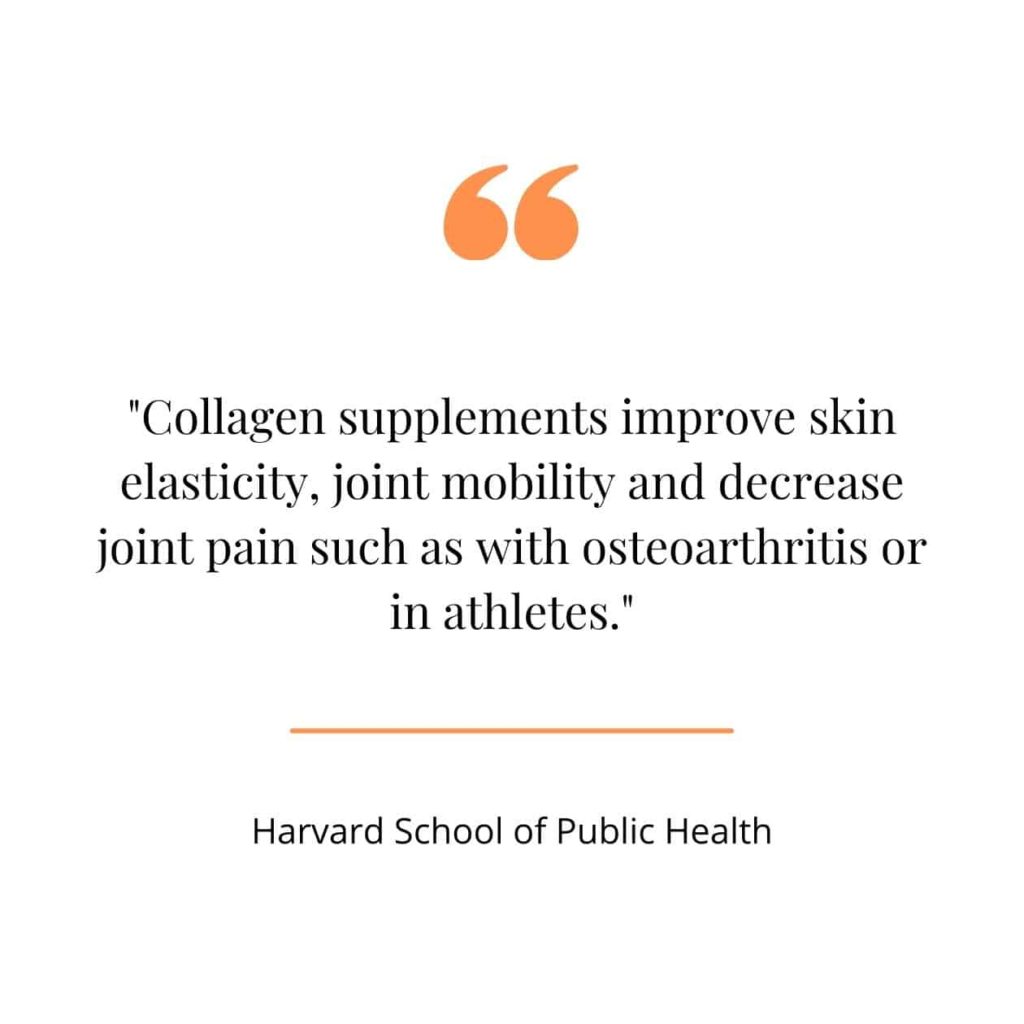
Collagen is made naturally in our bodies from protein and nutrients in the meals we consume. There are many forms of collagen, each with its own function. Type I collagen, for example, is well-known for maintaining skin suppleness, whereas type II collagen aids in joint protection.
Overall, the collagen supplement research is sparse, and many of the published studies appear to be from collagen product manufacturers, so it’s hard to say what the proven benefits are.
A handful of studies have, however, shown how collagen has typically affected the skin, bones, joints, and muscles of those who have taken the supplement regularly.
It’s also important to note that collagen supplements are not as strictly regulated by the FDA in the United States as pharmaceuticals.
That being said, there’s been plenty of unofficial studies and surveys that have shown how collagen supplements have affected those taking the protein. And the feedback has shown to be very beneficial!
Here are a few benefits that collagen supplements can have on women:
1. Collagen may aid in the development of lean muscle.
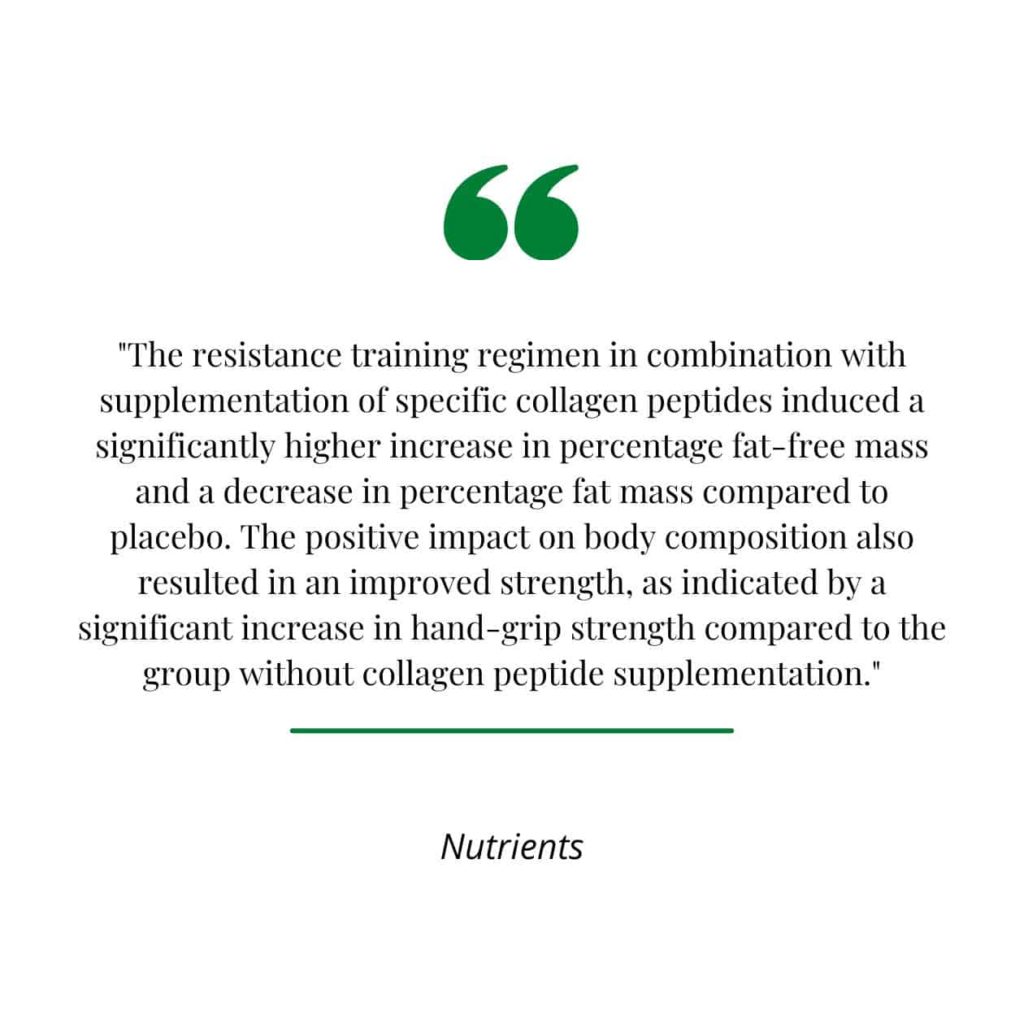
As you age, it’s likely that your muscle-building capabilities will begin to deteriorate. You may even start to lose muscle mass and find it more difficult to get in shape as a result of this.
Collagen is a major component of lean muscle tissue as it provides the structure and support that muscles need to function properly. When collagen levels are low, muscles can become weak and frail.
Collagen supplements are thought to help build lean muscle mass and improve athletic performance. This is likely due to the fact that collagen is a major component of tendons and ligaments, which are essential for movement.
Furthermore, a new study has shown that collagen supplementation can help reduce inflammation and joint pain.
2. Collagen may aid in weight loss and maintenance.
Even if you’re perfectly comfortable with your present weight and don’t intend to lose any pounds, collagen can assist you in keeping your current weight stable. Collagen helps women lose and/or maintain weight in a few different ways!
Collagen helps by increasing our metabolic rate, which means we burn more calories digesting food. When we supplement our regular diet with collagen, the body is able to more easily break down and use the protein for energy instead of storing it as fat.
Collagen may also help suppress the appetite. One study published in the National Library of Medicine showed that gelatin (which is derived from collagen) helped reduce hunger and promote feelings of fullness. This is likely because gelatin slows down the emptying of the stomach, which in turn makes us feel fuller for longer periods of time.
A research study on the Effect of Oral Ingestion of Low-Molecular Collagen Peptides Derived from Skate (Raja Kenojei) Skin on Body Fat in Overweight Adults has also shown the correlation between collagen and weight loss and the potential to increase the satiety hormone in our bodies after consuming collagen.
The full feeling we get after eating collagen or taking collagen supplements is due to the satiety hormones. The satiety hormones essentially communicate to our brain telling it that we aren’t hungry anymore. This makes it far easier for us to maintain a healthy diet and a sustainable lifestyle.
It can be difficult to use collagen to assist you in losing weight, and it’s critical to keep track of your intake. There are restrictions to any dietary change, just as with any other diet. You may actually gain weight by eating too much protein if you eat more than enough calories.
If you have any questions or concerns about using collagen supplementation to aid your weight loss journey, be sure to consult your doctor or a nutritionist in order to best incorporate collagen into your daily routine.
3. Collagen may counter low estrogen production

Women’s hormones shift and change with all the different life events and stages a women has like pregnancy, birth, and menopause.
When it comes to women’s health, estrogen is often the most discussed hormone. That’s because estrogen aids in anxiety management, mood regulation, and sleep cycle balance. It’s also your major reproductive hormone.
However, as you may know, estrogen levels decline with time, particularly after menopause. These changes might introduce a slew of daily mood and health changes and issues.
Women around the age of 50 or older tend to have completed or are nearing the end of menopause. After menopause your body is no longer making as much estrogen and this can cause changes in skin and bone health, along with many other health issues.
Estrogen levels drop as women get older and this is connected with a reduction in collagen synthesis, or the natural production of collagen.
As our skin gets thinner, our bones become more brittle, and our other organs struggle to maintain high amounts of tissue, it becomes clear that collagen plays a significant role in how we age.
A lack of collagen production as we age is likely a result of the drop in estrogen levels. In other words, a decrease in collagen may be one indication that our estrogen levels have dropped too low.
Bone health becomes more and more important as we age since bones can become brittle and more prone to fracture. Collagen may help counteract some of the bone density loss that can happen after menopause.
In a study on post-menopausal women, those who were supplemented with collagen over the course of 12 weeks had increased bone mineral density in their hips.
This was likely due to collagen’s ability to improve gut health and reduce inflammation, which in turn allows the body to better absorb calcium and other minerals needed for bone health.
If estrogen and collagen levels are linked, then it makes sense for women to greatly benefit from extra collagen intake in order to maintain their health inside and out.
4. Postmenopausal bone support is provided by collagen.
As we age, our bodies begin to produce less collagen, leading to a decrease in bone density and an increased risk of fractures. For postmenopausal women, this can be a particularly serious issue, as they are already at greater risk for osteoporosis.
However, according to UCLA Health, collagen supplementation has been shown to help maintain bone density and improve bone strength.
Collagen makes up the majority of bones, whether you’re a man or woman. As a result, as our estrogen and collagen production decreases with age, our bone mass declines as well, and can lead to a number of issues down the road.
Low blood mineral density in the bones is linked to brittle or weak bones. Blood mineral density is the measurement of minerals, such as calcium, in your bones.
Women over the age of 50 may benefit from the aid of supplements like collagen and calcium in order to maintain or even improve their blood mineral bone density.
Additionally, collagen has also been shown to reduce joint pain and stiffness, making it an ideal supplement for postmenopausal women who want to maintain their bone health and quality of life.
5. Gut Health

Although gut health collagen is a new field of study, research has established a connection between low collagen levels and digestive health.
Collagen helps to form a barrier between the gut and the bloodstream. This is important because it helps to protect us from food-borne bacteria and other foreign invaders that can cause infection.
In addition, collagen production helps to keep our intestinal lining healthy. A damaged intestinal lining can allow bacteria and toxins to leak into the bloodstream, leading to all sorts of problems like inflammation and autoimmune diseases.
A study published in the National Library of Medicine shows that collagen supplements may also help improve gut health by increasing the production of digestive enzymes and promoting the growth of healthy bacteria.
This protein offers two extremely beneficial and specific amino acids: glutamine and glycine.
Glutamine has been shown to reduce inflammatory processes in the intestinal wall and improve intestinal permeability.
Glycine is a nutrient that helps the body to make glutamine, and is essential for the detoxification of harmful substances in the gut keeping the gut balanced and happy.
As a result, collagen supplements may help with conditions such as leaky gut syndrome, Crohn’s disease, Celiac disease, and Ulcerative Colitis.
Collagen peptides are also low-allergenic and do not contain any gluten.
6. Joint Health
The most up-to-date collagen research focuses on joint health at the moment. Collagen supplementation has been linked to reduced arthritis symptoms since at least the early 1990s.
According to a 2009 research in the International Journal of Medical Sciences, four out of five people with osteoarthritis who took a daily 40 mg dose of undenatured type-II collagen experienced an average 26 percent decrease in pain.
Type-I collagen is created from the protein in cow bones, and it does not contain any hidden or fish scales. (Type-II collagen is produced from chicken cartilage rather than cow bones and hides or fish scales.)
In one study of postmenopausal women, those who took a daily collagen supplement showed improvements in their bone mineral density a year later, especially when they took it in combination with Vitamin D and calcium.
The researchers aren’t exactly sure why collagen seems to strengthen our skeleton, but they think it might trigger certain anabolic processes that promote the growth of bones.
The Bottom Line
Collagen is the most abundant protein in our bodies. It’s responsible for our skin’s elasticity, hair’s shine, and bone’s strength. As we age, our collagen production declines, leading to a number of health issues.
Fortunately, you can supplement your body’s diminishing collagen supply by taking collagen peptides. Collagen supplements have been linked to a number of health benefits, including improved joint health, gut health, skin health and more.
If you’re interested in trying a collagen supplement, make sure to choose one that is high quality and sourced from grass-fed, pasture-raised animals.
You should also look for a product that has undergone hydrolysis, as this process makes it easier for the body to absorb the collagen.
As a woman, there are plenty of advantages to adding a daily dose of collagen into your diet. And with so many ways to take it, there’s really no excuse not to try it!
Browse through our selection of clean-sourced collagen products or have a look at some other health-related articles to answer any other collagen questions you may have.
Organixx Clean Sourced Collagens blend contains five types of collagen from four sources. What’s more, it’s combined with targeted nutrients such as zinc, vitamin C, and vitamin B6 which specifically enhance the bioavailability and potency of collagen. Clean Sourced Collagens is formulated from the ground up to enhance and support your body’s natural ability to heal and rebuild itself from the INSIDE out.

The holiday season is upon us again! Although this time of year can be notoriously hard on the waistline, we here at Organixx have been working on some delicious but still nutritious recipes for you to enjoy.
These recipes were created with real, whole foods to help keep you on track with your healthy routine – without causing the sugar highs and lows of most traditional holiday fare. For even more tips on staying healthy this holiday season, be sure to check out our 27 Holiday Hacks article.
Healthy Holiday Recipes
#1. Holiday Share Wreath With Crunchy Veggies & Pumpkin Dip
For a share platter that wows and is ultra-healthy and yummy, you and your guests will love this share wreath with its delicious pumpkin dip. Make sure to include the cumin in the pumpkin dip; it has some very real health benefits, including naturally helping to lower cholesterol levels.
Vegetables:
- 8 cups broccoli florets
- 3 cups Brussels sprouts, trimmed
- 2 cups green beans, trimmed
- 1 cup sugar snap peas, strings removed
- 2 cups cauliflower florets
- 9 cherry tomatoes
- 1 bunch curly kale
- Large round or oval platter or serving board
Pumpkin Dip:
- 1 cup canned or pureed pumpkin
- 1 can black beans, rinsed
- 1/2 can cannellini beans, rinsed
- 1 scoop collagen powder
- 2 tablespoons extra virgin olive oil
- 2 cloves garlic, minced
- 2 lemons, juiced
- 1/2 teaspoon cumin
- Salt and pepper, to taste
To prepare vegetables: Rinse all vegetables well. Place a large pot of water on to boil and have a large bowl of ice water close by. Blanch broccoli for 1 or 2 minutes in the boiling water. Using a slotted spoon, transfer the broccoli to the ice bath to cool, then drain well. Blanch the Brussels sprouts, green beans, and snap peas using the same method. Let cool.
To prepare dip: Place all dip ingredients into the bowl of a food processor or blender and process until smooth. Transfer to decorative serving bowl, then place this in the center of your platter.
To assemble: Arrange the kale around the edges of the platter, placing the curly edges on the very outside edge of the platter or board. Top with broccoli florets, Brussels sprouts, green beans, snap peas, and cauliflower in the form of a wreath. Garnish with cherry tomatoes (so they look like clumps of berries). Can be refrigerated for up to 1 day prior to serving.
#2. Super Healthy Snack Crackers
These vegan, gluten-free, and grain-free crackers are easy to prepare and surprisingly tasty. So much better for you than potato chips, corn chips, or dipping breads. Serve alongside your favorite dip or salsa.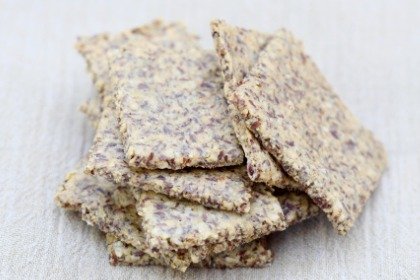
Ingredients:
- 1-3/4 cups ground flaxseed
- 1/2 teaspoon finely ground pink salt
- 1/2 teaspoon garlic powder
- 1 teaspoon Herbes de Provence
- 1/3 to 1/2 cup filtered water
Directions:
- Preheat oven to 400ºF (200ºC). Into a large bowl add all dry ingredients (including the Herbes de Provence, which are a huge part of the flavor and enjoyment of this recipe). Add the water, starting with 1/3 cup. Using a fork, mix ingredients until a smooth dough forms. If necessary, add more water. This part can also be done with a food processor.
- Place the dough between two sheets of baking parchment. Using a rolling pin, roll out the dough until it is the desired thickness of a cracker. Remove the top sheet of baking parchment and place dough (along with the bottom layer of baking parchment) onto a baking sheet. Using a sharp knife, gently cut dough into squares.
- Bake in preheated oven for 30-40 minutes, until crisp and the edges are browned (try not to let the edges go black though). When the crackers along the outside edge of the baking sheet are done, remove them from the oven and return the others to the oven until they are golden brown. Let cool, then place into an airtight container.
#3. Gluten-Free, Low-Fat Holiday Gravy
For those who wish to avoid the wheat and grease-laden traditional gravy, but still want depth of flavor, this recipe will do the trick. Vegan butter can be found at most large grocery stores and health food shops, or make your own from the recipe just below.
Ingredients:
- 1/4 cup vegan butter
- 1/2 cup onion, diced
- 1/2 cup finely chopped mushrooms (optional)
- 1/4 cup gluten-free flour (have more in reserve)
- 3 cups organic vegetable stock
- 2 tablespoons tamari sauce
- 1 tablespoon gluten-free Worcestershire sauce
- 1 teaspoon poultry seasoning, or favorite mixed herbs
- Salt and pepper to taste
- Fresh parsley
Directions:
- Into a large saucepan over medium heat, place the vegan butter and let melt. Add the onion and mushrooms (if using) and sauté until very soft and transparent (don’t rush this part, it should take about 10 minutes). Stir in your choice of flour, a small amount at a time, and it will form a thick paste coating the vegetables.
- Slowly whisk in the vegetable stock, then the tamari and Worcestershire sauces, and your choice of herbs. Whisk until smooth, raise the heat a little, and bring mixture to a low, bubbling boil.
- Reduce heat to low and simmer for 10-15 more minutes, during which time it should thicken up nicely. If it gets too thick, add a little more stock. If it is too thin, take a ladle of gravy out and put it into a small bowl, whisking in some of the reserved flour to make a smooth slurry.
- Whisk the slurry into the hot gravy, raise heat as necessary until mixture has thickened. Taste test and season with salt and pepper as needed. Garnish with fresh parsley.
#4. Vegan Butter
If you’re cutting out dairy or following a vegan eating plan, you’ll love this vegan butter recipe inspired by lovingitvegan.com that is so much healthier than margarine made with vegetable oils.
Note that you will need to remove this butter from the refrigerator a few minutes prior to spreading on fresh bread or creaming in a recipe as it will be quite solid. This should last up to two weeks in the refrigerator, and also freezes well.
Ingredients:
- 1 cup refined coconut oil, melted (do not substitute with extra virgin coconut oil)
- 2 tablespoons your choice avocado or hemp oil
- 1/3 cup unsweetened hemp milk
- 1 teaspoon apple cider vinegar
- 1 teaspoon nutritional yeast
- 1/2 teaspoon Himalayan salt
Directions:
- Into a blender container, add melted refined coconut oil along with the avocado/hemp oil, set aside.
- In a measuring cup, add apple cider vinegar and hemp milk, stir to combine. The mixture should curdle slightly. Add this to blender container. Add nutritional yeast and salt and process in a blender until quite smooth.
- Pour into a small glass dish and refrigerate until solid.
Watch a video of Katrina making the Vegan Butter recipe
#5. Simple Cranberry Cinnamon Sauce
Rather than grabbing for a jar or can of sugar-laden cranberry sauce, this year try making your own. You will still need a sweetener, but using organic maple syrup or raw honey is a healthier option and you can control the sugar level, which you can’t with pre-made cranberry sauce.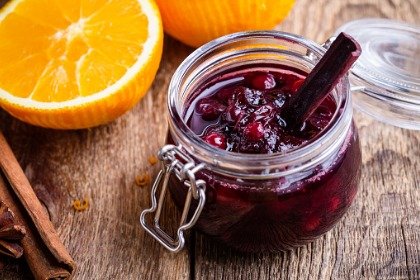
Ingredients:
- 1 pound (453 grams) fresh organic cranberries, washed
- 1/2 cup pomegranate or orange juice
- Your choice of maple syrup or raw, local honey
- Cinnamon stick (or one drop of food-grade cinnamon essential oil)
Directions:
- Into a large saucepan over med-high heat, place the rinsed cranberries, water, and cinnamon stick.
- Choose your sweetener, and start with just 1/4 cup. As mixture begins to boil and cranberries pop, taste (careful, it’s hot!) and add more of the sweetener of your choice if needed. If you choose to use cinnamon essential oil instead of a cinnamon stick, add it at the end when cranberries are cooling.
- Cranberry sauce stores well in a covered container in the fridge for a week or more, so feel free to make in advance. Place into a festive serving dish to serve.
#6. Ginger Beer Pomegranate Mocktail
This is a crowd-pleaser – tart, tangy, and full of antioxidants and gingery flavor. Yes, there’s sugar in the ginger beer or ginger ale, but it isn’t a lot and helps to offset the tart cranberries.
Despite the word “beer” in the name, ginger beer is typically non-alcoholic. Look for a brand that uses the fewest ingredients (i.e. additives) possible.
Ingredients:
- 1 tray of ice cubes
- 1 cup (250 ml) cranberry juice (with no added sugar)
- 2 cups (500 ml) pomegranate juice (with no added sugar)
- 3 cups (750 ml) ginger beer (or ginger ale if you cannot find ginger beer)
- Thin slices of fresh ginger root (peeled)
- Juice from 1 lime
- Fresh pomegranate seeds and mint leaves for garnish
Directions:
- In a large 8-cup glass pitcher, add a tray of ice cubes, then add the two juices and the ginger beer/ale and thinly sliced fresh ginger root. Stir together.
- Pour into glasses, squeeze in a little lime juice, and garnish with mint leaves and fresh pomegranate seeds.
Watch a video of Katrina making Ginger Beer Pomegranate Mocktail
#7. Baked Sweet Potatoes With Goat Cheese
Rather than succumbing to the usual sweet potato dish swamped in marshmallows, try this instead. Sweet potatoes are full of beta-carotene, and other vitamins and minerals. Goat cheese is considered a healthier option than cheese made from cow’s milk because it has fewer saturated fats and less cholesterol, is rich in vitamins and minerals, and has a healthier type of casein.
Ingredients:
- 1 sweet potato for each person (do not peel)
- Organic goat cheese, crumbled
- Handful of pumpkin seeds (pepitas)
- Freshly chopped chives
- Sea salt flakes
- Butter (vegan or regular)
Directions:
- Preheat oven to 400°F (200°C). Place each sweet potato onto foil square, place a small amount of butter on top (about 1/2 teaspoon), sprinkle with sea salt flakes, then wrap each potato loosely with the foil and place on baking tray. Bake in preheated oven for 50-60 minutes, until a knife can easily be inserted right through each potato.
- Using oven mitts, remove potatoes from foil (being careful not to burn yourself) and place onto serving plate. Slit potatoes open and into the center of each one place a portion of crumbled goat cheese, pumpkin seeds, freshly chopped chives and a dollop of butter. Serve immediately.
#8. Roasted Pumpkin and Brussels Sprouts
Brussels sprouts are a Christmas classic in England, but they usually don’t make the list of favorite holiday foods in the U.S. This recipe may just change that! Roasting these vegetables until they are slightly golden really improves their flavor and texture, and they are full of antioxidants, anti-aging minerals, and vitamins.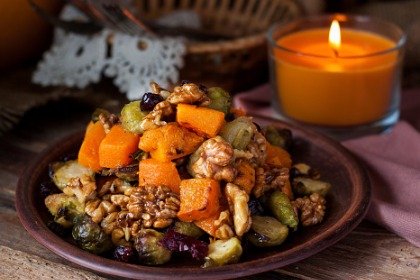
Ingredients:
- 2 tablespoons lemon-infused olive oil
- 2 cups Brussels sprouts, sliced in half
- 2 cups pumpkin, peeled and diced into 1-inch cubes
- Freshly chopped herbs of your choice (i.e. rosemary, chives, thyme, dill, oregano)
- Freshly ground pink salt and black pepper, to taste
- Toasted nuts and dried cranberries for garnish (optional)
Directions:
- Preheat oven to 425°F (210°C). Cover a large baking sheet with baking parchment paper. In a large bowl combine the Brussels sprouts, pumpkin cubes, fresh herbs, olive oil, salt and pepper. Arrange vegetables onto a baking sheet in a single layer.
- Bake in preheated oven for 40 minutes, or until the vegetables are tender when tested with a fork. Remove from oven and serve immediately.
#9. Mix-and-Match Holiday Fruit Crumble
A nice change from sugar- and wheat-laden holiday desserts, fruit crumbles are healthy(ish), delicious, and still retain much of their vitamins and minerals, even though baked.
Ingredients:
Choose from any one of these to make 6 cups of fruit or create your own unique combination:
- 5 cups thinly sliced apples + 1 cup fresh/frozen cranberries
- 3 cups thinly sliced apples + 3 cups fresh/frozen mixed berries
- 3 cups thinly sliced apples + 3 cups fresh/frozen thinly sliced rhubarb
- 3 cups fresh/frozen strawberries + 3 cups thinly sliced pears
- 3 cups thinly sliced peaches + 3 cups fresh/frozen strawberries
- 2 cups blueberries + 2 cups strawberries + 2 cups raspberries
In addition to your chosen fruit combination, you’ll need:
- 1 tablespoon arrowroot starch
- 1 cup brown rice flour
- 1 cup gluten-free rolled oats
- 1/2 cup chopped almonds, walnuts, or pecans (optional)
- 2/3 cup raw honey
- 1/3 cup coconut oil (warmed slightly if solid)
- 1 teaspoon cinnamon
- 1/2 teaspoon allspice or cloves
Directions:
- Preheat oven to 350°F (180°C). In large glass baking dish greased with coconut oil, combine the fruit and arrowroot starch.
- In a separate bowl, combine rice flour, oats, nuts, raw honey, coconut oil, and spices. Mix together until slightly crumbly. Sprinkle evenly over fruit mixture.
- Bake in preheated oven for 45-55 minutes, or until toasted and golden brown. Cool slightly and serve while warm and fragrant. (It also tastes delicious cold!)
#10. Dairy-Free Pumpkin Pie
While pie is rarely considered “healthy,” this is an old favorite made healthier and is a good choice for people who have given up dairy. The others won’t even notice the dairy is missing. The coconut milk will not impart a coconut flavor; it will be a rich and delicious pumpkin spice flavor.
Ingredients:
- 3 eggs
- 1 can (15 oz/425 gm) can organic pumpkin puree (or 2 cups fresh pumpkin puree, strained over fine mesh strainer to remove excess liquid)
- 1 cup full-fat coconut milk
- 1 teaspoon vanilla extract
- 3/4 cup dark brown sugar
- 1/2 teaspoon sea salt
- 1 teaspoon ground cinnamon
- 1/2 teaspoon clove
- 1/2 tsp nutmeg
- Pre-made pie crust of your choice, unbaked
Directions:
- Preheat oven to 425°F (210°C). In a large bowl, beat the eggs until creamy. Add in pumpkin puree, coconut milk, and vanilla extract; beat until well combined. Add sugar, salt, and spices and beat until completely combined.
- Into a dish containing the pie crust, pour the pumpkin filling over the crust. Cover the crust with foil or pastry shield to prevent burning. Bake pie for 15 minutes. Reduce oven temperature to 350°F (180°C) and continue to bake for 50 to 60 minutes, or until a knife inserted into the center comes out clean. The filling may still be a little wiggly in the center, but it will firm up as it cools.
- Allow pie to cool on a wire rack for two hours (remember not to rush this). Serve or refrigerate until ready to serve.
#11. Peppermint Fudge No-Bake Energy Bites
Is mint chocolate your guilty pleasure? Try these no-bake energy bites that are full of delicious and healthy ingredients… with nothing to feel guilty about.
Ingredients:
- 1/2 cup raw almonds
- 1/3 cup pitted dates (about 6 or 7)
- 1 tablespoon Organixx Clean Sourced Collagens powder
- 1 tablespoon organic cacao powder
- 3/4 teaspoon pure vanilla extract
- 1 drop peppermint essential oil
- 1 tablespoon coconut oil
- 1 tablespoon miniature dark chocolate chips
- Optional outer covering: cacao powder, toasted coconut, toasted chopped nuts
Directions:
- Into the container of a food processor, place almonds and process until finely chopped. Add dates and process until smooth. Add collagen and cacao powder, vanilla extract, peppermint oil, and coconut oil. Process for several minutes, until mixture begins to look well combined. Add a teaspoon of water, if necessary, to help it all combine. Add chocolate chips and pulse a few final times to combine well, making sure not to completely pulverize the chocolate chips; you want them chunky still.
- To roll into balls, take a heaping teaspoon of the mixture in your hands and roll it into a ball. The coconut oil will soften and it may be a little messy but it helps to bind these together. Place your choice of outer toppings (cacao powder, toasted coconut, or toasted chopped nuts) into a bowl and roll each bite through this.
- Place balls onto serving plate or container and refrigerate for 30 minutes prior to serving to solidify the coconut oil. Enjoy!
Watch a video of Katrina making the Peppermint Fudge No-Bake Energy Bites
We here at Organixx wish you and your family a safe and happy holiday season, filled with the people you love… and lots of healthy, delicious foods. Want more healthy recipes? Click here to check out our recipe page.



